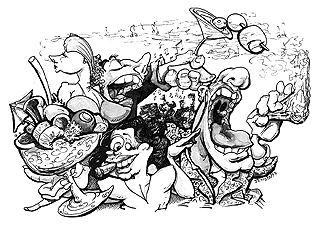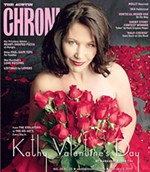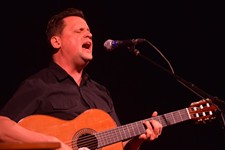Slouching Towards Gomorrah
At the Intersection of Jazz and Lounge
By Michael Bertin, Fri., June 6, 1997
|
|
At Cedar Street you can enjoy a Thelonious Monk any night of the week. No, not the Thelonious Monk, but a Thelonious Monk. It's a drink -- vodka, butterscotch schnapps, and frangelico -- one of about a dozen on the bar's martini menu. And theirs isn't the only place in town where martinis and cigars are all the rage. They're everywhere. Consider them the hammer and sickle of the lounge revival.
It's no secret that for the past couple of years the so-called "lounge revival" has been in, er, full swing, but it's only recently that clubs catering to the scene have been popping up around town like acne on the face of an oily-skinned teen: The Speakeasy, Caucus Club (where apparently "Jazz is the law"), Cedar Street, Sullivan's, and to some degree even the B-Side -- hell, when brew pubs start throwing "... and we have martinis and cigars" on the ends of their ads, it's a full-on McTrend. And the trend has helped spark a musical revival that continues to mushroom.
Whether the trend has given rise to the bands or the bands to the trend is a moot question. Locally, it's probably a little of both. A couple of years ago, prior to there being much of a scene, the Lucky Strikes had trouble getting gigs and were playing places like the Hole in the Wall. A couple of years prior to that, Dino Lee (aka Mr. Fabulous) was playing a show that was closer to GWAR than it was to swank. Obviously, some have come to the party later than others. That, however, is of secondary relevance. What does matter is that the two, the scene and the bands, are inextricably linked in a symbiotic relationship. You don't sip martinis and listen to Nirvana. That's what heroin is for. No, you lounge and listen to what's ostensibly being referred to as `jazz.'
Or do you? The swing scene has been fueling a rekindled interest in America's musical contribution to world culture and exposing younger audiences to an art form that, historically, has been ghettoized as old people's music. Yet, instead of being a PR windfall for local jazz musicians, this whole lounge thing has been polarizing some factions of players around town.
Delineating those factions calls for some clarification. Underneath the rubric of "lounge" there actually falls a variety of
stylistic sub-sets; musically the trend encompasses everything from straight-ahead jazz to jump blues, from French cabaret to Cuban son. The common denominator -- and often the only thing that matters to the crowds -- is that the music swings. And therein lies the root of much of the hostility. Many different styles of music are actually (and somewhat incorrectly) getting lumped together. The musicians, however, are usually quick to defend what they are doing, and the intensity of territoriality varies proportionally with the distance from true `jazz' they consider themselves to be.
On the campiest end of the scene, a band like the Recliners, who works up Murph and the Magic Tones-esque arrangements for songs such as AC/DC's "Back in Black" and the Ramones' "I Wanna Be Sedated," has a very firm grasp on what it's actually doing. Recliners' guitarist Eric Calistri quips, "People always ask, `Oh, do you guys play any jazz?' And I always say, `Never on purpose.'" In fact Calistri, who describes himself as "basically out of touch with reality at all times," claims that he's only heard of more prominent national acts like the Squirrel Nut Zippers and Combustible Edison through the fans that come to his band's gigs.
|
|
Tomás Ramirez, a veteran of the local jazz scene, is very dogmatic and very clear about what's currently going on around town. "There's just so much mediocre stuff called jazz nowadays that it kind of pisses me off when people go, `Oh, we're a jazz band.' No you're not. You know. You're a bad band.... They're doing a disservice to the community by actually going around and calling themselves jazz bands. They're not jazz bands." Ramirez doesn't single anybody out, but does refer to what's dominating the scene now as "that goddamn lounge shit."
An assertion like that, though, begs the question: What is jazz? And that's the question of the ages.
In the Twenties, with Louis Armstrong and the migration of players from New Orleans to Chicago and New York, Dixieland became the first identifiable and popular form of the music. Later that decade, Duke Ellington came along and ushered in the big band and swing era. Then, with the decline of big bands after World War II, two things happened: Crooners moved to the forefront and brought popular standards to mass audiences; "serious" jazz stopped being danceable and evolved into something harmonically and rhythmically complex. First, it was called bebop and Charlie Parker was the man. Then, in the Fifties and Sixties the music became "cool" with Miles Davis. In the Seventies, it morphed into fusion with players forcing rock beats into jazz structures. Recently, it's been Kenny G and John Tesh spearheading a neo-classical return to serious jazz. No, no, no. Just kidding.
The answer to the question, "What is jazz?" is then obviously, "Uh, well, hmmm... we're not really sure."
"Things get fused up," says Jon Blondell, a local trombone player who fronts his own jazz quartet and plays bass with Jake Andrews. "Turn on a country radio station today, you hear things that 15 years ago would have been Weather Report, just as far as chord changes go." Now, nobody's mistaking George Strait for Joshua Redman, but again, much of the confusion and hostility over the music can probably be cleared up and defused, respectively, by placing the crux of the blame not on the musicians, but rather on the patrons of the newer clubs that are popping up around town. After all, many of the bands dominating the lounge scene locally don't even claim to be jazz bands, yet from an audience perspective, a band having a horn player is often sufficient reason to qualify them as one.
To the chagrin of the purists,
81/2 Souvenirs has won the "Best Jazz Band" category in the Chronicle's Music Poll for two years running, even though Julianna Sheffield, former singer for the band, notes that they never claimed to be playing "jazz" in the first place. It's the readers that gave them the award. Audiences loved the band and were going to give it something, and whether it was by ignorance or by default,
81/2 Souvenirs got the jazz award. (In the absence of a "Best Band for Django Reinhart Fans" category, what did you expect?)
More to the point, perhaps, is that in many of these new rooms around town, the band is often just part of the decor. People don't even know the music isn't jazz, because they're too busy not paying attention to the band in the first place. The martinis are dry, the people are beautiful, the cigars come from some country that patrons can't locate on the atlas and, oh, there's somebody on stage. That's all that matters.
It's a situation that inspires a little resentment on behalf of the musicians regardless of where they sit in the respectability hierarchy. Sheffield, who now performs as a solo artist, bemoans that, "It's almost more important what dress I wear than if I'm singing in the wrong key." In fact, not only are the bands often not the focus of what's going on in the clubs, according to Ramirez, being a good enough player to get people to notice you is actually a liability. "The more proficient you are at what you do," he says, "the less they want you to play at their places. They don't want someone that's going to grab anybody's attention."
Enmity for the crowds or the clubs notwithstanding, there are potential spillover benefits from the lounge trend. As deplorable as the scene may be to jazz purists, it could help fuel and sustain what typically has not been a commercially viable style of music. The people are there, so the possibility at least exists that some of them might actually pick up on the music -- even if it's a poor, watered-down substitute for straight-ahead "serious" jazz. A person could become interested, start exploring, walk into a local record store, and pick up a few CDs in order to learn more and familiarize themselves with the genre. Next thing you know, boom, another Coltrane fan is born.
Yet, even if nobody delves any further into the music or buys any CDs, even if it's Absolut and not Blue Note making out like bandits, even if nobody drops a dime into the music once they leave the club, again, the people are there and they are there in large numbers. There is a tremendous opportunity for players to capitalize on this lounge trend, or this contagious pretension, or this synthetic nostalgia and revivalism, or whatever it is.
Many musicians are getting good work beyond what they were getting just a couple of years ago ("good" meaning "well-paying"). Elias Haslanger, for instance, fronts his own septet in addition to his gig with the Lucky Strikes, and it's his playing sax with the latter that allows him to pursue the former. "Luckily I'm able to work in a good band that fits into the lounge category and does a good job at what they do, and get paid pretty decently for it," he says. "At the same time, I can still have a creative outlet to do more of what I'm in line with and what I want to do for my long term deal with my band. It's a good position to be in."
|
|
The attitude of not capitulating to or rationalizing away a necessary evil is in many ways commendable, yet at some point integrity just becomes tired snobbery. And to many people, even good jazz musicians, it is just snobbery. When the alternative to playing for people who might not notice you is playing for nobody at all, don't think there aren't people who prefer the latter. For his part, Blondell swears that "A lot of guys are happier playing a club with five people listening and feeling proud of, `We're so good that only these five people can understand us.' Jazz people are like that, and not just in this town either."
And isn't it a bit crass of the old guard jazz community to assume that people in these new venues won't understand them in the first place? On Monday nights, just a couple of blocks away from each other, are the weekly jam at the Elephant Room, the only haven for purists the last few years, and Haslanger with his septet at Cedar Street. Both are jazz shows, both draw a decent crowd for a Monday, and both crowds behave very much alike. A musician solos, the audience claps.
Granted, there are a few more people at the latter venue who aren't paying attention to the band at all, and just start clapping as a reflex, but take away, say, one-third of the audience, and you still have two nearly indistinguishable groups of people, responding similarly to similar music. Why is it that the audience at the Elephant Room presumably "understands" the music, whereas the group at Cedar Street is blandly following the bland down the social path of least resistance?
Well, that's not an entirely rhetorical question; a good number of people in the crowd at the Elephant Room are musicians either wanting or waiting to jam. It only makes sense to assume they probably have a deeper understanding of the music than even the average fan -- hell, they can play the stuff. Moreover, the amount of chatter during the shows at Cedar Street indicates that the applause might be largely Pavlovian. `The solo has stopped, therefore it must be time to clap.'
At some point the stereotype is self-verifying, and it doesn't matter whether it's Latin jazz or jump swing being played on stage -- it's the scene that matters. The bigger crowds are at the newer, trendier clubs, and music is of secondary importance to them. As for the people who take this stuff seriously, very seriously, the whole lounge revival phenomenon is not just a minor annoyance.
"It's not the evolution of jazz that we're talking about," says Ramirez. "We're talking about the de-evolution of society. Basically people are becoming less and less aware. And people's soul is being replaced with stuff -- you know, things they can get and things they can see as opposed to things they can feel, inspiration."
The lounge scene may be one more indication that we are indeed slouching towards Gomorrah, but people want to enjoy the demise. They want entertainment. They want something to do, and bandwagonism is the only thing that's always more en vogue than nostalgia.
Never mind that some of the bands are anachronistically dressing Thirties but playing Fifties swing; never mind that those decades predate most of the clubgoers' births by many decades. For whatever reason, many people deem martinis and cigars worth spending their disposable income on. Therefore, they and all of their friends are probably going to spend their disposable income on those items and do so without much reflection. Enterprising people are naturally going to respond to the demand for those goods by opening up venues that provide them and an environment in which to enjoy them. (C'mon kids, this is just Econ and Soc 101).
"Serious jazz," however, might be the incidental casualty of the need to provide a soundtrack for this latest cultural trend. As Eva Lindsay, proprietor of the Victory Grill points out, there are essential things that the more lucrative gigs and the glitzier scene cannot give. "The music has a story and a sound," she says, "and I think that what happens is that the martini crowd doesn't hear the story in the music."
They can't teach it either. At the Victory Grill, younger players from the community, kids from the local high schools, get the chance to jam with people like Ron Brown and get validation from them, which keeps them playing and inspires them to continue developing. Lindsay resurrected the Victory Grill precisely to provide those kinds of things. She calls it "warmth," and claims, "Young men don't get that at the Caucus Club. I'm sorry. And it's a real pretty place. I've been down there. I wish I had the mahogany and all. But a young man would never develop in a Caucus Club, and that's the difference."
Jazz is cerebral stuff. It takes chops -- technical proficiency -- but it also takes soul. Walk in to the Victory Grill on a night when things are really cooking and you can feel that soul. It seeps out of the walls (Blondell noted that it's probably what a good room in Kansas City must have been 50, 60 years ago). Take that soul out of the music and you're left with non-dairy creamer -- some piss-poor substitute for the real thing.
Yes, the lounge scene is a trend, and like any other trend it will, by definition, end. It will go the way of the hula hoop, Ross Perot, the pet rock, and disco. The difference is that nobody (save maybe Gloria Gaynor) lamented the death of disco. Jazz, on the other hand, is what America has given the world. In a couple of centuries, people are going to look at the legacy of Duke Ellington analogously to the way they look at Beethoven's. How much collateral damage can we afford to inflict upon this music?
Elvin Jones, John Coltrane's old drummer, tells a story of the first time 'Trane played with Thelonious Monk. They were jamming and Coltrane had apparently lost himself in what he was playing. He had gotten so inside, he couldn't stop. According to Jones, Monk finally stopped him, saying, in his deep, guttural voice, "Son, take the horn out your mouth." Substitute the word "cigar" for "horn" and, well, you get the picture. Besides, you might learn something beyond what a Macanudo is before all of these venues make drastic changes in order to cater to whatever you'll be demanding two years from now.










